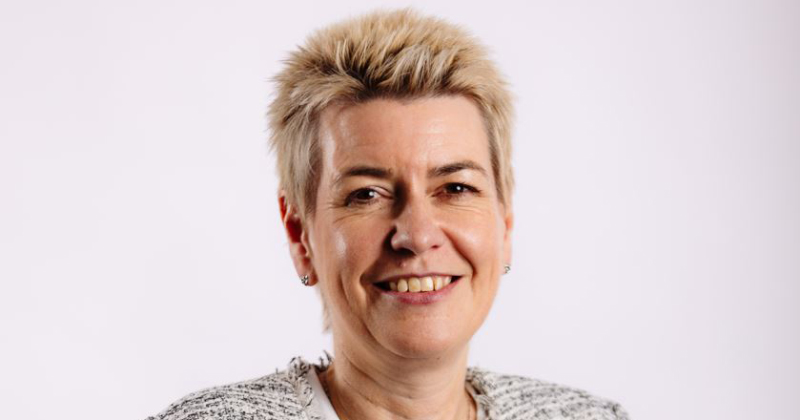Holex chief executive Caroline McDonald is on a mission to increase education opportunities for those who missed out on the best start in life
As a young graduate living in South Africa, Caroline McDonald was walking through Cape Town one morning listening to music on her portable CD player, on her way to the homeless boys’ hostel where she was a volunteer.
At the time (2001), she was working as a night manager at a backpackers’ hostel while also volunteering at the hostel.
Some boys from a local street gang approached and asked if they could listen to what was, to them, her strange musical contraption (she was playing “Travis on repeat, in between Phil Collins”).
She handed it over and they “popped it in their ears and laughed”. Onlookers “didn’t know what to make of it” in a city where muggings were common. “But I trusted them”, she says. They repaid her trust and handed it back.
The story is typical of McDonald’s faith in human potential and the importance of giving opportunities to those who lack the best start in life. These days she draws on those values while leading Holex, representing the country’s 140-plus adult community education providers who are themselves busy turning lives around.

Her experiences in South Africa, where she confronted “off the charts” poverty and young gang members “fighting for survival”, were the catalyst that compelled her to carve out a career helping adults to access education.
In August she became the first chief executive of Holex, leading three staff including Sue Pember, “the queen of adult education”, who has been its policy director for the past nine years.
The team has no office building – McDonald speaks to me on her son’s laptop (hers is being fixed) from her living room in Maidstone, Kent. But, while small in human resource, Holex is mighty in clout.
In “every meeting” that McDonald has had with key sector players, including the FE commissioner and DfE officials, she has been told that “Holex punches above its weight”.
But McDonald has been taken on to help it grow – “not just in our reach, but the representation of our membership”.
Her job description explains how the infrastructure supporting adult education has “reduced and changed”, with members looking to Holex for “added advice and guidance. In response, Holex is now ready to grow into a new form.”
The mice and the pumpkin
It has already come a long way since being formed in 1993. A year earlier, general FE was removed from local authority control, leaving councils with responsibility for adult education services that were then (bizarrely) known as “large external institutions”.
Holex was formed to support their heads, and the somewhat clunky name it was given – heads of large external institutions – stuck.
For the next 10 years adult education providers saw cash pouring in from central government and the European Social Fund (ESF), with public spending on adult skills in England peaking at £6.3 billion in 2003-04. By 2022-23 it had shrunk by 30 per cent to £4.4 billion, with adults’ classroom-based learning decreasing by two-thirds, according to the Institute for Fiscal Studies.
In 2016 Holex’s members included over 700,000 learners. By last year that had shrunk to 400,000.
“Trying to run a service within a local authority is incredibly hard when they’re being squeezed from every angle,” says McDonald.
While some see adult providers as the “Cinderella of the education sector”, she believes they are “the mice and the pumpkin, scrambling around for the scraps. Yet, we’re the ones that magically make things happen on the tiniest crumbs.”
While children’s education “resonates with the public on a higher level”, sometimes “it feels like working with adults is not the sexiest of jobs”. It’s very difficult to engage in an emotive fight for funding when “no one wants to take away money from children”.
Despite this, providers have somehow managed to improve the quality of their services: 97 per cent of Holex’s members are rated ‘good’ or ‘outstanding’ by Ofsted, up from 88 per cent four years earlier. Yet there is little public awareness of how adult education is being run locally.
Almost 70 per cent of the country is now devolved, with regional combined authorities equipped to manage their own adult education budgets.
Control over the budget is a carrot being dangled in all the new devolution deals. But the “classic electoral rhetoric” of combined authority mayors tends to be around public transport and jobs – not adult education.
Last week, Holex ran a webinar called “influencing the influencers”, helping its members to “speak to this new tier of politician, policymaker and commissioner, particularly in mayoral combined authorities”.
Providers within local authorities “don’t have comms teams or policy advisers – experts at their fingertips to write a paper and pop it on the mayor’s desk – so we’re trying to help them”.
There is also the challenge of delivering local agendas while being “dictated to on a national level through wider budgets and policy decision-making”.
In a recent survey, over 90 per cent of Holex members saw the interpretation of new government policy as a “high” or “very high” priority when it comes to the support they need.
A Brum start
McDonald has spent the past two decades watching policy shifts in adult education from a different angle, in roles that involved community outreach and engagement work for the university sector.
The eldest of four siblings, she was the first in her family to go to university, studying politics at Leicester. She hails from Birmingham’s Peaky Blinders territory of Small Heath but believes she “must be the only person” in the city not to have watched the show.
As a “huge Aston Villa fan”, she never misses watching Match of the Day with her 13 and 10-year-old sons, Glenn and Shaun.

McDonald’s mum was only 19 when she was born. Her parents split up when McDonald was 12 and she lived with her dad, Pete, a former marine who left school at 16 but encouraged his children to push themselves academically.
He discovered a love of learning history and geography later in life, which influenced McDonald’s conviction that “it’s nonsensical” to believe that “education should be closed off because you’re no longer classed as young”.
After graduating and moving to Cape Town, she met her husband, a Dutch engineer travelling the world. She checked him into the hostel where she worked. They have been together ever since.
Human jigsaws
On returning to England a year later, McDonald moved to London, where she ventured into outreach work for Kilburn Into Training and Employment (KITE). The now defunct charity benefited from “loads” of ESF money targeting neighbourhoods needing skills improvements.
McDonald helped local people to develop their CVs and interview skills. One single mum, Deli, was “highly capable” despite having mental health problems. She was determined to be a positive example to her son.
McDonald put support around her that enabled her to do a level 2 course. This provision was “hyper-local” – a really important factor in getting many adults learning again – and provided “at a pace suited to her”.
She thinks that adult education has felt the cuts “most acutely” in the loss of such “hyper-local providers and charities … Without them, you just take away opportunities to engage with adults.”
McDonald learned to reject the misconception that adults “only have ambition for their children, not for themselves”. She saw them as “human jigsaw puzzles”.
Typically, adults cannot progress in their education and training until “every single piece of their puzzle is in place”. This might include “childcare, benefits, or sorting their mum out on a Wednesday… then, they’re absolutely ready to rock”.
Outreach for HE
She spent the next two years as a community outreach manager for South Bank University in London, boosting its local community relations. She had “an absolute blast” on information stands at Elephant & Castle shopping centre, directing locals to careers guidance and taster courses.
Sometimes, people “just wanted to be heard and told, ‘you’re not incapable’”. Others wanted help finding pathways to their dream careers.
McDonald spent the next 18 years at Birkbeck University, starting in a role heading up a new outreach project in pre-Olympics Stratford. The area’s demographics were completely different to the Bloomsbury-based university’s traditional intake.
Birkbeck had received significant funding from the Higher Education Funding Council for England (HEFCE) to take a “more flexible approach to learning, in a part of London where HE participation was really low”. McDonald was “proud as punch” to have been part of a venture that “really changed Birkbeck”.
She also got involved in applying for funding and developing access agreements at a more strategic level. But she became painfully aware of the difficulties involved in “continuing the mission to be a mature learning institution”, when “that market was diminishing”.
“How do you keep your values going when all the pressures around you are saying, ‘don’t do it?’ That was really hard.”
She started working with local authorities, including Camden and Barking and Dagenham, to explore the “hyper-local perspective around what their residents needed”, then tailoring Birkbeck’s programmes around those needs.
A free community leadership programme was launched to help local volunteers to become “advocates and activists”.
It helped them to “identify and tackle a problem at a community level, while also giving them analytical thinking and research skills. At the end, you’d say to them, ‘look, you’ve just done a university module’ and they wouldn’t even know it.”
The golden thread
When she joined Holex, McDonald was already familiar with the adult education sector, but she was still surprised by the “sheer volume of what they do that isn’t talked about enough”.
She has taken the helm at a time of great need for more investment in adult education; the national retirement age keeps creeping upwards, and the employment rate of the over-50s has decreased each year post-pandemic (from 72.5 per cent in 2019 to 70.7 per cent in 2023).
Meanwhile, the rate of 16 to 24-year-old NEETs (not in employment, education or training) was up last year. McDonald is concerned that higher wage bills as a result of post-budget tax changes will see it spiral further, piling pressure onto adult education providers.
While at Birkbeck she prepared the university for the lifelong learning entitlement, which had initially been due to launch in February 2025 but has been pushed back to January 2027. She even held a presentation for Holex members on the issue. But she worries that the entitlement “won’t benefit adults unless you have an adult education system that prepares them for study”.
She finds it “hilarious” that there is currently no national lifelong learning strategy around the entitlement. She and Pember “talk all the time” about the need for one.
Just as championing adult education has been a golden thread running through her career, McDonald is now passionate about making it a “golden thread running through this government’s policy decisions”.
She gets frustrated on her members’ behalf, that the “security of funding and longer-term planning that could really make a difference in communities just isn’t happening the way it should.
“There’s incredible provision that exists up and down the country. But you don’t always know it’s there until you need it.”



